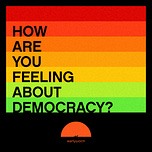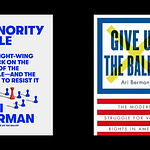Those with the most power tend to oppose democracy. And that even seems to be true as we face actual fascism.
Dr. Jennifer Mercieca -- our guest for the second episode of "How are you feeling about democracy?" -- told me that as long as there has been a United States those with the most to lose have been the most afraid of rule by the people. Her first book explored our Founding Fictions. And she thought that might inspire America to become more democratic.
Instead, we got Donald Trump.
Her second book "Demagogue for President: The Rhetorical Genius of Donald Trump" exposed the verbal weapons Trump was wielding as he tried to take and hold power. Now she's warning us that Donald Trump is no longer running just to be a demagogue. He wants to be a dictator.
We spoke to Dr. Mercieca about her love of democracy, Donald Trump's rhetorical yet evil genius, and how she accidentally helped inspire the project that you are now involved in -- earlyworm.
You can listen to episode 1 with Ari Berman here.
*********** TRANSCRIPT
Jason Sattler: Your book on Trump's rhetoric opens with a warning. And the warning is, this will make you mad. I think one of the things that makes people most angry, at least when I do it, is when you point out that Trump is actually extremely good at two things -- PR and getting away with crimes.
He didn't accidentally wander into the White House after somehow avoiding indictments for the first seven decades of his life. Do people get mad at you for calling Trump a rhetorical genius?
Jennifer Mercieca: They don't get mad. But yeah, they do want to mock that idea. There's a real, I think, need for people to think that Trump doesn't know what he's doing. Right. Because it's almost like, it's too evil. It's too, it's too, you know, villainous for someone like Donald Trump to exist in the world. And so, he has to be this bumbling idiot. In a lot of ways, he is a bumbling idiot. But not when it comes to using rhetoric as a weapon, not when it comes, like you said, to getting away with crime.
He's very, very good at coming up with strategies that allow him unaccountability that prevent him from being held accountable. I mean, just what he's been doing with all these legal cases is astounding. It's been fascinating to watch in real-time how all of these court cases, 91 indictments, and this guy is able to delay, obfuscate, take advantage of the law, take advantage of compliant courts, run out the clock... It's just an amazing thing to behold, really.
Jason Sattler: And to spend just a moment longer on this idea of genius.... You said recently there's not much to say new about his rhetoric. Do you see much difference between the Trump of 2016 and 2020 and 2024?
Jennifer Mercieca: I think that there are some important differences. So to address your first question, the genius thing comes from a rhetorical theorist named Kenneth Burke, who is writing in the 1930s and 40s and 50s in the United States. And he wrote a book review of Mein Kampf, of Hitler's Mein Kampf.
He explained what he called Hitler's "demagogic effectiveness." And so I use the word rhetorical genius sort of as the modern version. "Demagogic effectiveness" doesn't sound quite right, you know, to the modern ear. And so I'm kind of playing, yeah, I'm kind of playing with Trump saying he's a genius all the time and everything like that.
Jennifer Mercieca: So it was a little bit of that, but also frankly, he is quite good at it. In a diabolical way, but but good at using it to avoid accountability. And, and there are differences between 2016 and 2024. Of course, one of the major differences is that in 2016 and 2020, Trump ran as a demagogue. He ran saying, I want to be an unaccountable leader. Put me in charge. I'll effect the MAGA agenda for you. You know, mostly within the confines of the existing political order, a constitutional order of the United States. But I will use my power as an unaccountable leader for you. Right, MAGA. In 2024, he's running as a dictator. And what that means is that he is promising to destroy the constitutional order in order to effect the MAGA agenda.
And so I think that's a significant difference. And so in that, you see a lot more intensity in his language. He did those kinds of intense moments in 2016. But he would often pull back and he would be funny and he would be, you know, the sort of goofball, amiable Donald Trump that a lot of people sort of admire and like. But in 2024, he's cornered. He is threatened and vicious. And he's attacking the United States more overtly than he did before.
Jason Sattler: You've talked a lot about how fascism is for losers. Why is this rhetorical frame so important to you?
Jennifer Mercieca: Yeah. I think it's really important for people to understand how fascism works and how a fascist appeal, like Donald Trump saying that he'll be a dictator to effect the MAGA agenda in 2024, works.
It works because fascist leaders pretend to be an Übermensch . They pretend to be a strong man. And the reason why they do that is because. Right wing authoritarian voters have a high need to follow a strong leader. They are very interested in hierarchy, defending group norms. They have a low tolerance for cognitive complexity.
And so they are looking for someone to say, this is really simple. Everything is black and white. You're with us or you're against us. Be with me: I will protect you. Right? And so for Donald Trump, he probably recognizes either intuitively or consciously, that he is a loser.
Donald Trump lost the popular vote in 2016. Donald Trump lost the election in 2020, though he won't admit it. Donald Trump, as the head of his party, has lost in 2018, 2020, 2022, and again here in 2024. He has a history of losing elections.
His approval rating was never over 46, 47 percent while in office. Political scientists who study the executive branch have ranked him as America's worst president, the very worst. So he looks like a loser. He looks like a weak loser. And that's the last person that his right-wing authoritarian voters would put in power.
And so if you wonder why they're always running down Biden for being old, for being, you know, mentally incompetent and not as physically strong as Donald Trump or mentally strong. All of those comparisons are made because they want to say that Biden is a beta, and that Trump is an alpha... That he's a strongman Übermensch and he, as the strongman, will become dictator in order to effect the MAGA agenda.
That's the story.
Jason Sattler: The polls aren't great and we have 100 percent awareness on both sides. How much of it do you think is tied into disbelief. They can't believe that this is actually happening again. And how much of it do you think is Trump has sharpened his appeal in a dark way at the right time?
Jennifer Mercieca: Well I'm not sure if either...
Jason Sattler: It could be another option! But those are the two things I've been thinking.
Jennifer Mercieca: I'm not sure if we can trust the polls. Frankly, I don't think that the American public is paying attention, right?
So all of the studies of journalism and news consumption say that 80 to 85 percent of the American electorate is avoiding the news at all costs. Right. They're getting their news in ambient ways, through friends and TikTok videos and things like that. Most people haven't paid attention to this election because it's not interesting, right?
We have these primaries where they're foregone conclusions who the nominees are going to be. Nobody is needing information. Like you said, they both have 100 percent name recognition. People don't waste their time, unless they're political news junkies, like we are.
So, you know, I think there's a bunch of us who are political junkies, and we're of course obsessed with all of this business. But I think that the primary itself is just a giant spectacle. We're not learning anything about the voters. And the voters aren't learning anything about the candidates.
And so honestly, I'm not sure what we're doing this year. It's a weird year and I think it's really difficult to predict what's gonna happen.
Jason Sattler: When it comes to our ability to persuade, I wonder how much of it is limited by our own worldview. If you only talk to people who agree with you, it becomes very hard to become persuasive. Does that make sense to you?
Jennifer Mercieca: Oh yeah, absolutely. When we study persuasion, we recognize that there has to be a room for persuasion, right? So you can't have persuasion if everyone thinks exactly the same. Groupthink does not require persuasion. You also can't have persuasion if everyone thinks so different that there isn't any common ground. You don't share a common understanding or any common reality, including facts, right? And so the way that our media systems have evolved has really made persuasion itself impossible. We don't share common sets of reality. We don't agree on facts. We don't agree on what sources of information are reliable for providing facts. We don't have the same frames. When we talk about complicated issues, things like the border. Frame warfare makes it so that the way that we understand those issues is so divergent from everyone on the opposite side that there's not even a way to have a conversation that makes sense.
And so the way that our media system has evolved... I call it the manufacture of consent and the manufacture of dissent. That's where we're at. Consent and dissent, neither of them are democratic, and neither of them are good for problem solving.
Jason Sattler: The idea that people need to be persuaded is kind of a fundamental principle of democracy, I think, if I'm understanding the way you talk about rhetoric. Fascists do something very different. They're not trying to persuade. So do you think even that kind of construction of the media is a victory for fascism?
Jennifer Mercieca: That's right. Absolutely. Because what it does is it enables fascists to use propaganda, to use information warfare to use compliance gaining strategies to manipulate and coerce the public, to shape public opinion towards fascist ends.
There's no accident in the fact that Mein Kampf is a propaganda manual, right? There's no accident in the fact that Putin is an expert in propaganda strategy. Donald Trump is so good at marketing and branding and demagoguery. There's no accidents. These strong men leaders always use language as a weapon.
Yeah, the media system has evolved in such a way that it enables that it makes it very easy and to me, it's fundamental and central to the present crisis.
Jason Sattler: What's the difference between propaganda and PR and marketing?
Jennifer Mercieca: Okay. So, marketing and branding. You want to shape the image of your company. You want to make people think highly of it, right? So if you read a public relations textbook, they'll say it's building mutually beneficial relationships between an organization and the public's upon which its success or failure depends. Little definition from a public relations textbook.
Jason Sattler: Top of your head.
Jennifer Mercieca: I memorize weird things. That I memorized in the 90s for some reason. But anyway Donald Trump is good at branding and marketing. He's good at public relations. And so, for example, when he ran in 2016, he started branding his opposition.
You might remember Low Energy Jeb, Little Marco, Lying Ted, Corrupt Hillary... The press loved it. They were like, what? Look at this craziness. But that is also a demagogic strategy, right? It's a way of undermining your opposition. It's, attacking their person instead of their arguments, shifting the nation's attention away from whatever the actual issues are toward the person, denying them credibility, denying them standing to make arguments, or to even be considered as having valid points of view. It's a strategy of warfare, of communication warfare.
If you were in a debate and somebody made an ad hominem attack against you, you would appeal to the judge and say, "Point of personal privilege. They're attacking me personally instead of my argument." The debate judge would, adjudicate that and decide, but we live in a world where that's not possible.
And so instead, what it does is it fuels outrage. people who support that candidate are outraged that there is, this attack, this ad hominem people who support the Donald Trump, the attacker. They circulate and amplify the attack because it's hilarious and we got them and it's so funny. And so it just takes on a life of its own, right? It's something that is clickbait. And so it's covered and all of that. You, you, you can see how it spins out. And so something that starts off as innocuous marketing and branding. We're going to shape a good public perception of our company. We're going to try to make the opposition look bad. This turns into a whole other thing when it's applied to politics and when it's used purposefully for coercion, right? To not persuade, but to avoid debate.
Jason Sattler: And so it's persuasion versus coercion?
Jennifer Mercieca: Yeah, that's how communication scholars think of it.
Persuasion is where you give someone a choice, right? You sort of say, like, you have free will and you have a mind of your own and you should be able to consent to what you are being persuaded to believe is true.
Coercion is a strategy of force. It's a kind of violence right? It says we're not going to give you a choice. Instead, we're going to play off of your vulnerabilities. And Donald Trump is very good at exploiting our vulnerabilities, the vulnerabilities that we have personally, our cognitive and emotional vulnerabilities the vulnerabilities of the media system, the vulnerabilities of the political system, the constitution itself. Donald Trump is a person who habitually exploits vulnerabilities.
And he has done that, of course, in America.
Jason Sattler: One element of coercion that is particularly stirring to me is the idea that Donald Trump can continue holding rallies after January 6th. To me, it's kind of like watching Osama bin Laden teach a flight school after 9/11. It's so rife with threat.
I wonder if this is something that shows that the danger of rhetoric when it's kind of beyond the law. Is there a historical example of how to quell fascism without becoming somewhat fascist yourself in the way you control language?
Jennifer Mercieca: Yeah, that's really the central issue. It's a conundrum. And it's an age old one, right? So democracies are so strong that they allow people to make arguments against democracy. Fascists don't do that. If you're in a fascist regime, they're never going to allow you to make anti-fascism arguments.
Right. Look what happened with Putin and Navalny. You can't critique a fascist leader like that. And so Donald Trump, of course, exploits that, and so have all previous demagogues and authoritarians and fascist leaders want to be strong men. That's the game, right?
You you exploit the weakness, the vulnerability in order to take power. So I think your question is, can you stop by maintaining your values? And you can, I mean, right? Like this is the, the best argument wins, right? The, the arguments should be allowed to take place and that the force of the better argument is better than force.
And so, what do you say if a nation is persuaded to give up its democratic form of government and embrace autocracy? I don't know. It's anti democratic to stop them, right? And so all you can do, I mean, if you're me, I don't know I don't know what somebody else could do, but all I can do is point out the ways in which people are being misled and they're not being persuaded, but they're being coerced.
So that people can recognize that and see what I think is going on and decide for themselves because, ultimately people have to choose their government. We can't choose it for them. And so people have to commit to democracy and democracy is not easy. It's hard.
It's hard work to maintain it. It's hard work to make it work in the first place. Right? Democracy is not easy and we've never had perfectly functioning democracy in the United States. But for sure, authoritarianism would be worse for all of us.
Jason Sattler: What do you hear as an expert in rhetoric when you hear someone say we're not a democracy or a republic, which I think was originally John Birch slogan in the 50s?
Jennifer Mercieca: So I actually wrote a book about this. And they're right. So I wrote a book called Founding Fictions and it's my first book and it's about the arguments that the Founding generation, the second generation of Americans, had over what kind of government we would have, what it means for a government based on the will of the people, what can the people do within that government and how we were imagined to act.
My point in writing that book was that, yeah, the founders didn't trust the will of the people. And so they created a republic. They never considered a democracy. Democracy was a bad word. It was a bad term for them. These were slaveholders. They were people who who wanted to have a lot of power and, and didn't see there could be pure democracy. And there's a lot of reasons for that based on how they understood political theory and history, communication at the time, all of that stuff... personal interest. But we have become more democratic, and probably you could argue that we weren't a full democracy in the United States in terms of having full access to the rights of citizenship till the 1960s. And we've seen everything that happened in the 1960s be contested.
So, we're a nation that uses democracy as a legerdemain, as a sleight of hand. And we've done that since Andrew Jackson. And, Andrew Jackson used the word democracy. He branded the nation and his political party as a democracy. But if you read his Farewell Address, when he referred to the nation in its political system, he always used the word republic. He used it like 11 times in his Farewell Address. He never tried to make the nation more democratic as the leader of the Democratic Party.
And so, they have a point. When I wrote that book, I had hoped that people would read that and go, wow, we need to have a constitutional convention and make this a more democratic nation. Instead, they have done the opposite, right? So they use that argument to say, well, see, told you.
Jason Sattler: They want to freeze it in time instead of using it as inspiration to actually change things.
Jennifer Mercieca: Yes. And I had thought that people would read that and do the opposite.
Well. That was my bad
Jason Sattler: Well, you have inspired some unintended consequences, and this is the part where I'm going to either thank you or apologize. By following you closely on Twitter, I came across a thread where you were talking, as you mentioned before, about news junkies. That's I think the 20 to 30 percent of us who are obsessed with the news. We check our phones on the way to checking our phones. If we find out two hours late that Mitch McConnell had stepped down, we feel like we didn't pick our kid up at school. We're different than most people. But we're also part of the problem. I didn't get that until you explained why we are the problem. Because we're so obsessed, journalism has to cater to us.
So can you tell us what it means to be a news junkie and why we are threatening the Republic?
Jennifer Mercieca: Yeah. This is a combination of reading a bunch of different scholars work and some bits from Ezra Klein's book on polarization. So me putting together this thing from from other folks' work. But yeah, we're political junkies, some of us. I'm one. You're one for sure. We spend all day on Twitter. We, like you said, like when I saw McConnell had stepped down. I was like, wait, what? Didn't, didn't I, did I know that was going to happen? That was surprising.
Jason Sattler: This is why I follow the news! So I'm never surprised.
Jennifer Mercieca: Like my poor husband, he can't have a conversation with me because he watches the news, like on the TV, and he wants to talk about it. I'm like, ah, that was yesterday. Come on. I knew that was going to happen already, you know?
And so, yeah, I mean, we alienate everyone else because we're obsessed with the news. We pay for the news. We spend all day clicking the links and talking about the news and arguing about it. And so the entire news industry is built on us and or has evolved to be built on us. And so it no longer speaks to, or frankly, is relevant to the majority of the nation. We sound crazy to them. They have no idea what we're talking about most of the time. We pay attention to these things in such great detail that, they would never do that. They're just not that interested in it. It's not, it's not fun for them the way it is for us.
And so we have in turn, polarized the news that caters to us. We have polarized the parties electing people that are ideologically pure from whatever perspective we're in on the left or the right, which alienates the majority of the Americans who are not ideologically pure. So the whole thing has kind of snowballed into what scholars talk about as "the other divide." That it's not just left versus. But it's the highly politically engaged versus the rest of the nation that either doesn't have time or interest or access maybe to spend all day thinking about politics.
Jason Sattler: Interest, I think, would be the biggest disqualifier. But so what we're trying to do at earlyworm is trying to turn political junkies into democracy junkies. So trying to freshen up the the material that we're taking in and make it so it's not all about what's going on with the Boebert family and make it more about what's part of the IRA and how you could actually electrify your house and give people actions that they could take that are related to the news, but that are not just "read more news." That's the one idea we have.
Do you have any other ideas that we could steal about how to make people more democracy focused?
Jennifer Mercieca: So the biggest thing, really the biggest problem that we have as a nation, is we have a lack of trust because trust is what brings people together. It allows for democracy to flourish.
And so our biggest problem is that these warring political junkies have made it so that no one feels as though they can trust anyone. And so, honestly, and this might feel a little weird at first, but the best thing you can do to help promote democracy in America is to join a reading group, to go to the library, to be in public spaces-- "third places," they call them. Hang out at a diner, chat with folks when you are in the elevator, just be out there in public and not be engrossed in your phone. Make small talk with folks in line at Starbucks or whatever. Those little tiny interactions add up to make the world a much more trusting place. Just have a random conversation with folks at Starbucks while you're waiting in line instead of looking at your phone. You will make that person's day. You will elevate their mood for the rest of the day. And they will start to believe that the world is a better place. They will start to believe that your community is a better place than they do now.
Alienation and isolation are democracy killers. And so we think we're connected because we're all wired up on our phones, but those connections aren't as important. It's alien to us as the day to day interactions that we have with strangers.
Jason Sattler: Well, that was not an answer I was expecting, and it's a great answer because it gives me a weird kind of queasy feeling about going into public next time.
Jennifer Mercieca: Don't just automatically pull out your phone. Right. Make eye contact with someone instead and see, ask them how their day is.
Jason Sattler: Don't just pull out your phone. I think I'm going to need a tattoo that says that.
Jennifer Mercieca: I mean, it's everybody's instinct, right? Yeah. Don't just pull out your phone, make eye contact. It's hard.
Jason Sattler: Yeah. Cause there's no one more attuned to, to entertaining us than this device we've trained to entertain us. So it is tough to beat it. It's for democracy. So we got to do it. Well, it is an honor to talk to you. I love following you. I love what you talk about. It makes me feel a little guilty about how partisan I am, but it does make me recognize that I always have room to grow and that's, what's so great about you.
And thank you very much for your time.
Jennifer Mercieca: Thank you. I am of course a huge fan of yours as well. So I'm really glad to be able to talk with you and I wish you all the success on your new venture.
Jason Sattler: Yes. And if we have some actual success, we will try to do some, maybe a small bust carved into a mountain or something. We will honor your, your inspiration, or we will stop saying it if you would prefer. Just let us know.
Jennifer Mercieca: Either way is fine.












